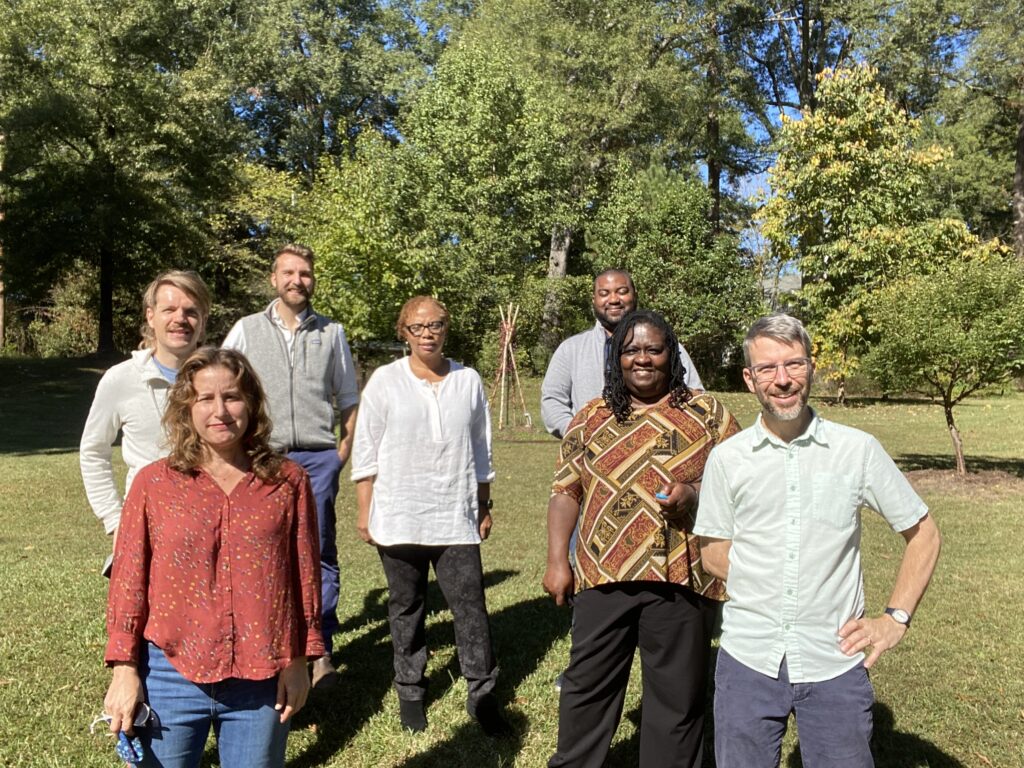About Us

Our Mission
We are a community of neighbors committed to interrogating the legacy of racist and exclusionary housing practices in our home of Durham, North Carolina.
Using community-generated data, we unearth racially-restricted covenants in Durham property deeds. By engaging with the covenants within an anti-racist space of shared story and mutual practice, we defy these monuments to hate and use them as guideposts toward transformative justice.
About the Project
Hacking Into History: Discovering Racial Covenants in Durham Property Deeds is a collaborative project between DataWorks NC, The School of Information and Library Science at UNC Chapel Hill and the Durham County Register of Deeds. The project was selected as a Civic Switchboard 2020 Field Project in February 2020 and began work in June 2020. HIH received additional funding from the Civic Switchboard Institute for a pilot project developing curriculum for use in the Durham Public Schools. The project is the recipient of multiple awards, including the National Association of Counties (NACo) Achievement Award (2023) and the International Association of Government Officials (iGO) Innovator Award (2022).
HIH aims to tell the story and impact of racially restrictive agreements contained in property deeds in Durham, North Carolina using public records information and archival documentation. While the history of redlining and its impact on American cities is increasingly well-known,1 the similarly widespread practice of encoding racially restrictive covenant clauses on property deeds has received significantly less attention.2 Our project mirrors similar collaborative efforts among libraries, civic data organizations, and community members to create online collections of crowd-sourced transcriptions of original property deeds containing racially restrictive covenants.3
Project goals include: (1) to inform community members about the history of exclusionary zoning restrictions in Durham; (2) to provide context for the city’s current affordable housing crisis; (3) to empower community participation in translation efforts and analysis of legacy documentation, turning handwritten documentation into human and machine-readable “data.”
1 The “Mapping Inequality” project explores the history of redlining and housing discrimination in US cities. See: https://dsl.richmond.edu/panorama/redlining
2 Racially restrictive covenants are “contractual agreements that prohibit the purchase, lease, or occupation of a piece of property by a particular group of people, usually African Americans. Racially restrictive covenants were not only mutual agreements between property owners in a neighborhood not to sell to certain people, but were also agreements enforced through the cooperation of real estate boards and neighborhood associations.” See: https://www.bostonfairhousing.org/timeline/1920s1948-Restrictive-Covenants.html
3 See, for example: Minneapolis https://www.mappingprejudice.org; Charlottesville https://mappingcville.com; and Hartford https://ontheline.trincoll.edu/index.html
Project Team
- James “JT” Tabron, Durham County Register of Deeds
- John Killeen, DataWorks NC
- L’Tanya Durante, DataWorks NC
- Libby McClure, DataWorks NC
- Tim Stallmann, Research Action Design
- Alexandra Chassanoff, School of Information and Library Science, UNC Chapel Hill
- Leroi DeRubertis, DataWorks NC
- Andrew Wagner, Attorney in Chapel Hill
- Tia Hall, Yinsome Group, LLC
Project Alumni
- Carrie Wilson, Graduate Student, School of Library and Information Sciences, NCCU
- Genevia Chamblee-Smith, Graduate Student, School of Library and Information Sciences, NCCU
- Alexis Bracey, Graduate Student, School of Library and Information Sciences, NCCU
- Drew Russell, Graduate Student, School of Library and Information Sciences, NCCU
- Janine Barr, Graduate Student, School of Library and Information Sciences, NCCU